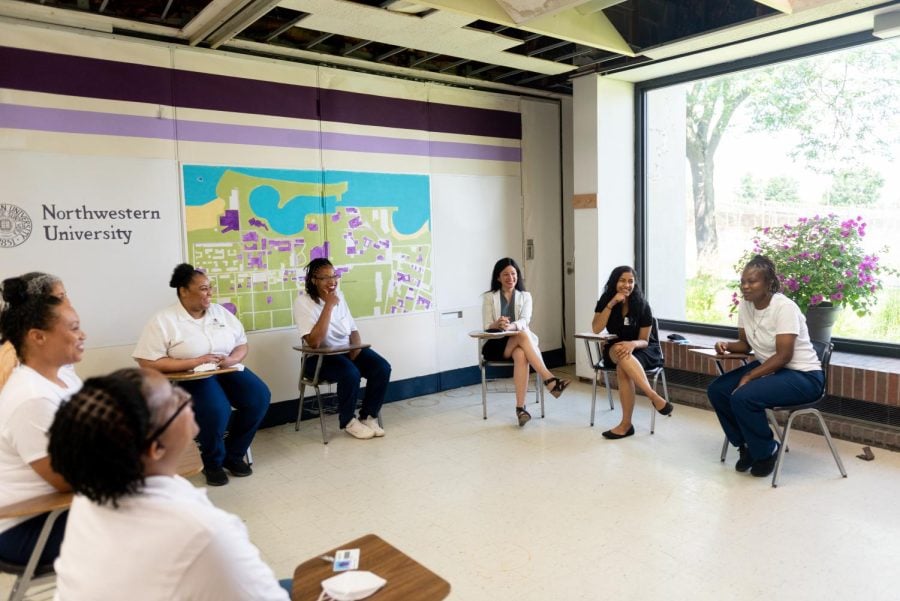NPEP expands to provide higher education to incarcerated women
Photo courtesy of Jennifer Lackey
Northwestern Prison Education Program Director Jennifer Lackey meets with students at Logan Correctional Facility.
January 23, 2022
After expanding to include students at the all-female Logan Correctional Center, Northwestern Prison Education Program has overcome obstacles from the pandemic, location and facility restrictions to provide incarcerated women with higher education.
Program Director and Philosophy Prof. Jennifer Lackey founded NPEP in fall 2018 at the all-male Stateville Correctional Center. With a $1 million grant, the program expanded to Logan Correctional Center. Lackey said the program aims to make a “positive intervention in the criminal legal system” by providing incarcerated people with a comprehensive liberal arts education to assist their reentry into society.
“For many of the students, being a member of an academic community, supporting one another, growing with one another, swapping assignments and getting feedback to one another has been not only empowering, but also tremendously community building,” Lackey said.
NPEP students at Logan started their college education journey amid strict pandemic restrictions in correctional facilities and without access to Zoom — 200 miles away from NU.
Logan students cannot use Zoom nor communicate virtually with their instructors and tutors outside the facility because the classroom is closed for COVID-19 safety. The program uses correspondence education, where professors ship material to students. Students then complete the work and send it back to be graded, sometimes waiting weeks for the next shipment.
“Starting college through this mode is not easy to do and the motivation that they had to persevere through the most challenging of circumstances and at the same time,” Deputy Director of NPEP Michelle Paulsen said.
The students couldn’t communicate with instructors and tutors via email, even though that is a screened form of communication, according to recently released NPEP student Maria Garza. Inmates at the facility can receive electronic messages through Global Tel* Link’s ConnectNetwork, but they cannot send messages.
Filled with questions while waiting for the next shipment of feedback and work, students would work together in the facility using “internal prison mail” or written notes passed between people to communicate. However, Garza said communication was not allowed, even if it was for a good cause.
“The frustrating part was just it being something new, not understanding and not being able to communicate with the sources that are trying to help us,” Garza said.
Despite the challenges students, instructors and tutors have faced, Paulsen said everyone involved has been resilient and kept a positive attitude through it all. Garza said one of the biggest impacts of being a student in NPEP is being a part of a program that provides higher learning education to the women in correctional institutions.
Lackey and Paulsen, who have both dedicated their careers to education, said they believe it is important to extend educational opportunities to everyone.
“Many of those students did not have the privileged backgrounds that many of the other students have. Many didn’t graduate high school,” Lackey said. “Yet, they were among the best students I had taught in my two decades of teaching.”
Email: [email protected]
Twitter: @shnnnmrynn
Related Stories:
— Northwestern Prison Education Program receives $1 million grant
— Northwestern launches prison education program, will provide college credits to inmates
— Illinois Prison Project ambassadors discuss incarceration and re-entry at One Book event


